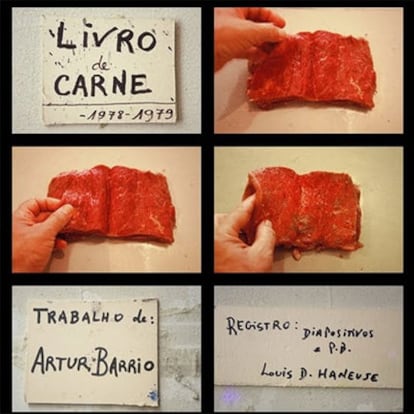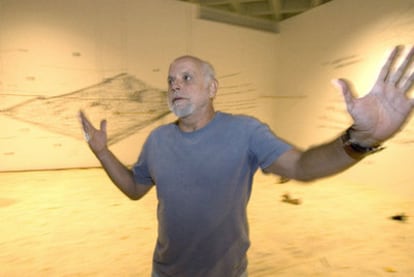Meet Brazil's "meat book" artist
Artur Barrio has been awarded the Velázquez Prize for long career using ephemeral materials
Artur Barrio, who this week was named the winner of the prestigious Velázquez Prize for Visual Arts in recognition of his career, is one of the most revolutionary figures in a Rio de Janeiro-based avant-garde movement characterized by its use of organic and biodegradable materials. Born in Porto, Portugal, in 1945, but having spent much of his career in Brazil, he's best known for his pieces using ephemeral materials such as meat, trash, urine, bread, wine, salt, raw fish and salt cod - just the thing to most annoy our hygienic Western society.
"I consider myself neither Brazilian nor Portuguese," says Barrio, who found out about his win via the EL PAÍS website while in his studio in Vila Nova de Gaia, near Porto. He's back in the country of his birth in order to acclimatize himself and not suffer "the ravages of jet lag" ahead of this year's Venice Bienniale where he's representing Brazil.
His "bloody bundles" are a reference to the way dictators dispose of bodies
"I like receiving a prize that makes me talk about 'Las Meninas'"
"I'm happy to receive the honor," he says. "It's true that I have displayed some animosity against prizes, but this is bigger. I don't want to think that there has been a strategic conspiracy, even though the members of the jury are great. It's emotional to receive it from a country where political art has been so important. Because my art is political. I consider myself more an anarchist than a communist. I think the financial value of art is secondary and have faith in the parallel, the marginal. I detest the commoditization of institutions."
Barrio's work formed part of the excellent exhibition, Río experimental. Más allá del arte, el poema y la acción (or, Experimental Rio. Beyond art, poetry and action) at the Botín Foundation last summer, though perhaps few people noticed the photos of his "situations" - artistic actions - or the documents that were on display. Perhaps the work of other show participants, including more internationally renowned artists such as Lygia Clark, Hélio Oiticica, Lygia Pape and Cildo Meireles, who was awarded the Velázquez Prize three years ago - eclipsed that modest material, typical of his output from the end of the 1960s and 1970s.
The artist, who has often disassociated himself from prevailing trends (attempting to follow Oiticica's well-known phrase, "Be marginal, be heroic"), moved to Brazil in the mid-1950s, having spent some time in Angola familiarizing himself with African culture.
At the end of the 1960s he turned his eyes toward the cheap materials that have most strongly defined his work since his well-known late 1970s work Livro de carne (or, Meat book). The use of such perishable goods backs up the essence of his works, which to a certain point are tied to the situationist idea that you don't have to create a parallel reality, just decontextualize the existing one. Part of this strategy are works such as Situación... ciudad... y... campo of 1970, in which a bundle of bread loaves is placed in unexpected places, transforming your perception of both object and place.
Constantly concerned with political questions, first in relation to Brazil's military dictatorship and later to Portugal, Barrio makes works with hints of vindication, as if it could be proved through the use of detritus or formulas such as the one employed in his work Fardos ensangrentados: situación, in which he wraps "bloody bundles" (20 kilos of meat and bones bought at a slaughterhouse in cloth and leather) and then leaves them in different places - a veiled reference to the horrors of dictatorship and the way in which it displaced bodies.
All that remains of these pieces, as in the case of so many conceptual artists' works, are photographs, which Barrio rejected as works of art in themselves in 1970: "The range of my work from photos, films... is made uniquely with an eye to information/dissemination." Despite everything, however, the photos of his "situations" have come to occupy pride of place in exhibition halls, as they have with the work of many others of his generation.
Maybe it's surprising that the Velázquez Prize is choosing to recognize the Brazilian avant-garde, as it also did with Meireles. And, maybe, the ironic response Barrio gave to his win over the telephone on Tuesday ("I like receiving a prize that makes me talk about Las Meninas, even though I prefer Los borrachos, so I will celebrate it with a rioja") makes the meaning of Oiticica's aforementioned phrase clear: to be marginal is to be a hero.


Tu suscripción se está usando en otro dispositivo
¿Quieres añadir otro usuario a tu suscripción?
Si continúas leyendo en este dispositivo, no se podrá leer en el otro.
FlechaTu suscripción se está usando en otro dispositivo y solo puedes acceder a EL PAÍS desde un dispositivo a la vez.
Si quieres compartir tu cuenta, cambia tu suscripción a la modalidad Premium, así podrás añadir otro usuario. Cada uno accederá con su propia cuenta de email, lo que os permitirá personalizar vuestra experiencia en EL PAÍS.
¿Tienes una suscripción de empresa? Accede aquí para contratar más cuentas.
En el caso de no saber quién está usando tu cuenta, te recomendamos cambiar tu contraseña aquí.
Si decides continuar compartiendo tu cuenta, este mensaje se mostrará en tu dispositivo y en el de la otra persona que está usando tu cuenta de forma indefinida, afectando a tu experiencia de lectura. Puedes consultar aquí los términos y condiciones de la suscripción digital.








































